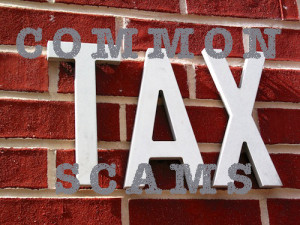Tax returns are a gold mine for scammers and identity thieves! Although the IRS has put many programs in place to prevent fraudulent returns, some are still passing through the safeguards. In 2011, more than 1 million fake tax returns were filed resulting in $3.5 billion in fraudulent refunds. It is very important that you protect your personal information and to make sure you keep your documents in a secure location. Here are a few tips of what to watch for and what to avoid.
Ignore unsolicited emails from IRS
A common way for thieves try to get personal information is by sending e-mails saying you are owed a refund. The e-mail will ask that you to hand over bank information so that you can receive your refund. Any e-mail asking for personal information should be a red flag. The IRS will never initiate contact by e-mail, text message or social media.
Hang up on suspicious callers claiming to be from IRS
A lot of scammers have been increasingly using the phone by telling taxpayers they are entitled to a refund or owe money and then asking for personal information.This is perhaps the largest scam out there today and has targeted more than 20,000 taxpayers with thousands of victims losing more than $1 million. They will use threats such as saying the taxpayer will go to jail if they don’t pay immediately with a prepaid debit card or wire transfer. This is a sure sign that it is not the IRS because the IRS has no authorization to arrest, deport or revoke a driver’s license. Fake agents use this effectively because they are able to mask their caller ID as someone from the IRS. In some cases they will even have the taxpayer’s last four digits of social security numbers and be able to follow up by e-mail. Don’t give out any information if someone claims to be from the IRS. Instead calls the IRS’s main line and verify if an agent has any reason to contact you.
Too-good-to-be-true claims
You may hear a lot of ads during tax season on receiving large refunds or special benefits to certain groups. There is no free money to be had from the IRS. Be aware of preparers that offer a fast return or an advance on your return. If a preparer doesn’t ask for proof of income, won’t sign a return or include his preparer ID number these are signs it may be a scam.
Make sure you receive all tax forms
Make sure you are receiving all materials for your taxes such as W-2’s, 1099’s, or any other information you were expecting to receive. A lot of scammers are stealing documents from mailboxes. First, if you fail to receive any forms call the company you were supposed to be receiving them from. Second, contact the IRS if you are suspicious your information has been stolen.




